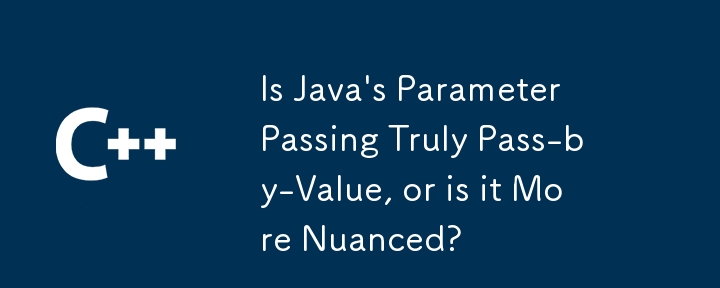Home >Backend Development >C++ >Is Java's Parameter Passing Truly Pass-by-Value, or is it More Nuanced?
Is Java's Parameter Passing Truly Pass-by-Value, or is it More Nuanced?
- Susan SarandonOriginal
- 2025-01-02 22:04:40654browse

Java Parameter Passing: Value vs. Reference
In Java, parameter passing semantics differ from languages like C#, where the "ref" keyword explicitly indicates reference passing.
Confusion Surrounding Reference Passing
Java's "pass-by-value" nature confuses developers because parameters of reference types (like objects) are actually passed by reference. However, this "reference" is simply the memory location of the object, not the object itself.
Demonstration of Value Passing
Consider the following code snippet:
Object o = "Hello";
mutate(o);
System.out.println(o);
private void mutate(Object o) { o = "Goodbye"; }
This code will print "Hello" to the console because the "o" parameter in the mutate method actually refers to a copy of the original reference. Assigning a new value to this copy has no effect on the original object's value.
Alternative Options for Reference Modification
To modify the original object, there are two options:
- Explicit Reference: Use a reference wrapper class like AtomicReference, as shown below:
AtomicReference<Object> ref = new AtomicReference<Object>("Hello");
mutate(ref);
System.out.println(ref.get()); // Goodbye!
private void mutate(AtomicReference<Object> ref) { ref.set("Goodbye"); }
- Getter/Setter Methods: As a general practice, it is recommended to use getter and setter methods to modify object properties instead of直接修改引用. This ensures encapsulation and correctness.
The above is the detailed content of Is Java's Parameter Passing Truly Pass-by-Value, or is it More Nuanced?. For more information, please follow other related articles on the PHP Chinese website!
Related articles
See more- C++ compilation error: A header file is referenced multiple times, how to solve it?
- C++ compilation error: wrong function parameters, how to fix it?
- C++ error: The constructor must be declared in the public area, how to deal with it?
- Process management and thread synchronization in C++
- How to deal with data splitting problems in C++ development

